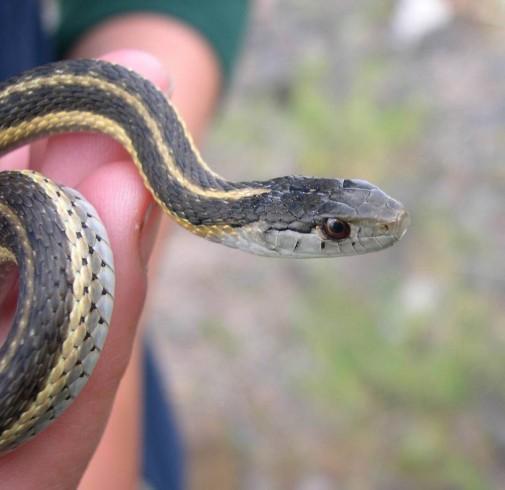Westmont Magazine Sparkman Studies Snakes
Amanda Sparkman ’03 has joined the Westmont biology faculty, bringing expertise in evolutionary biology, a love of field research and a determination to inspire students to appreciate animals, even snakes.
Sparkman didn’t intend to study the slithery reptiles when she entered a doctoral program at Iowa State University, but catching snakes with her adviser led to her interest in the animals. Describing snakes as gentle and surprisingly expressive, she says they’re fascinating and fruitful to study because biologists have largely ignored them.
Sparkman’s interest in animals and caring for God’s creation developed at Westmont. She took part in a global stewardship study program in Belize and became involved in two campus clubs: Organic Gardening and Environmental Stewardship. She spearheaded an effort to start recycling in residence halls and organized a creation care focus week featuring talks about the environment. She earned degrees in biology and English (summa cum laude in biology) and won the Dave Dolan Award for her green efforts.
At Iowa State, Sparkman completed a program in ecology, evolution and organismal biology. Her research there focused on the evolutionary ecology of the growth, reproduction and lifespan of garter snakes.
Sparkman studied red wolves, extinct in the wild after 1980, as a post-doctoral fellow at Trent University in Ontario, Canada. The U.S. Fish and Wildlife Service reintroduced the wolves in North Carolina in 1987 and followed several generations throughout their lives, yielding 20 years of data. She explored conservation issues and the wolves’ social organization and behavior, publishing her findings.
Sparkman belongs to a Westmont family that includes her mother, Sharon Clark Sparkman ’73, her uncle, Steve Clark ’69, a great uncle and aunt, Dick ’62 and Grace Mulholland ’50 Elkins, and seven Elkins, Mulholland and Wozniak cousins.
This summer, Sparkman expects to start a long-term research project on snakes at a local field site. She hopes to involve students in this work, helping them contemplate the natural world through the lens of scientific theories and enlivening their faith.
